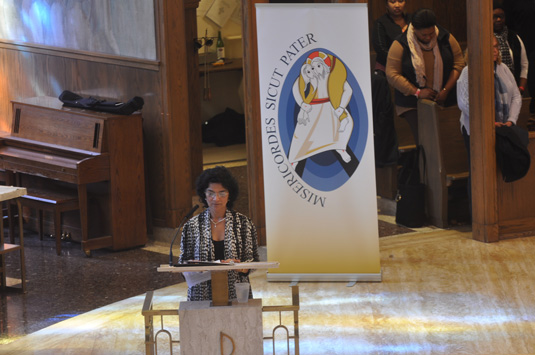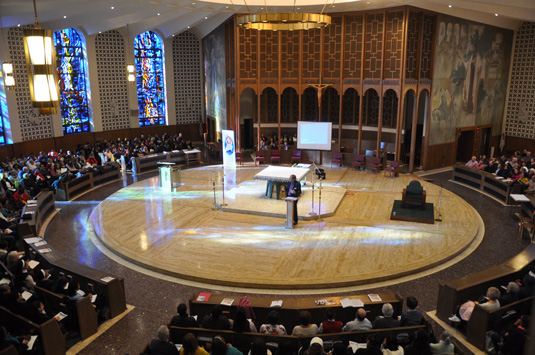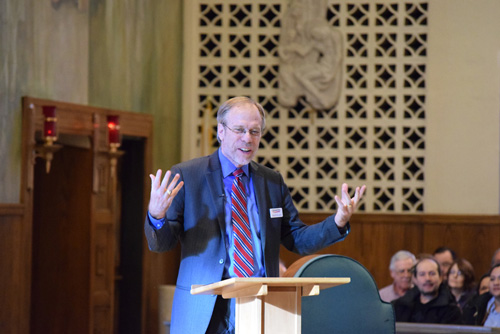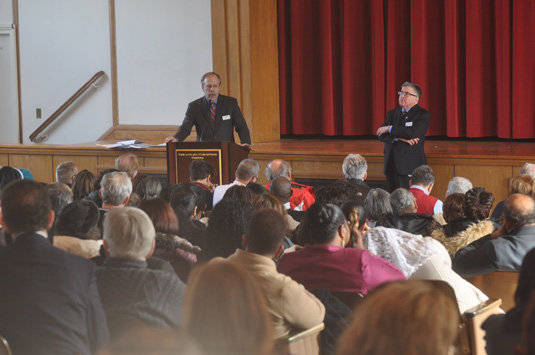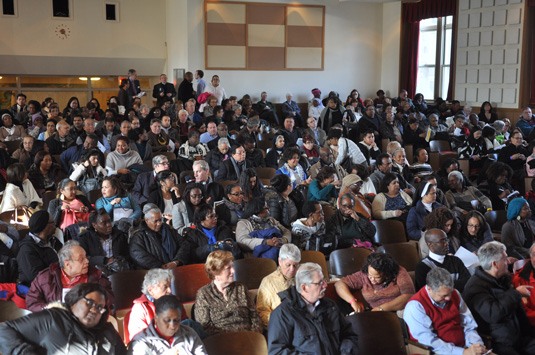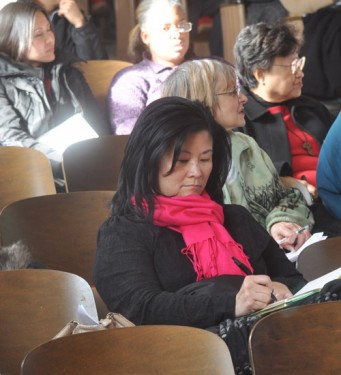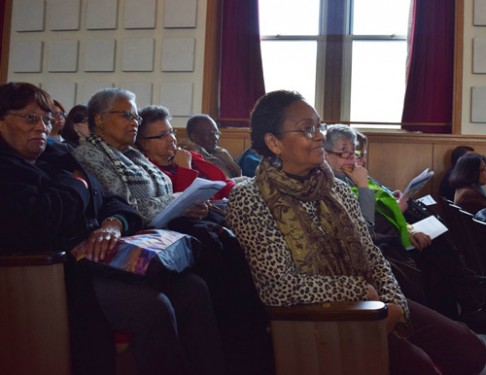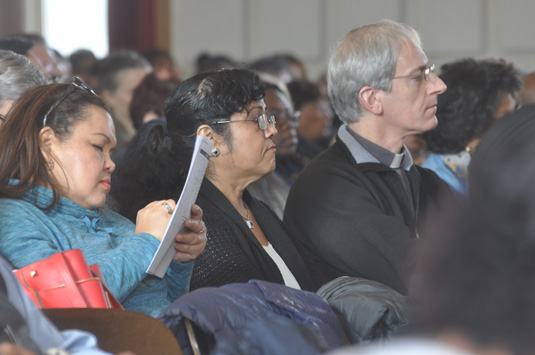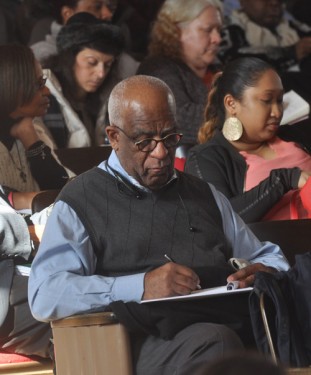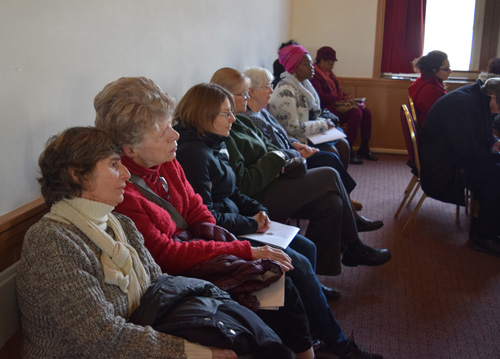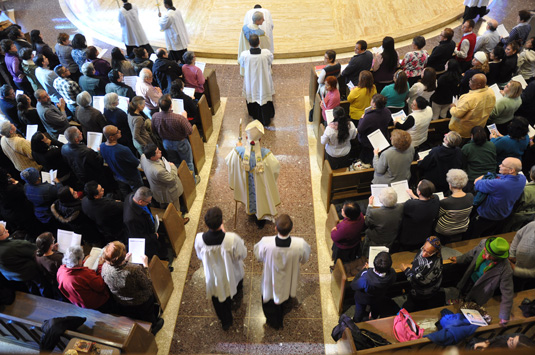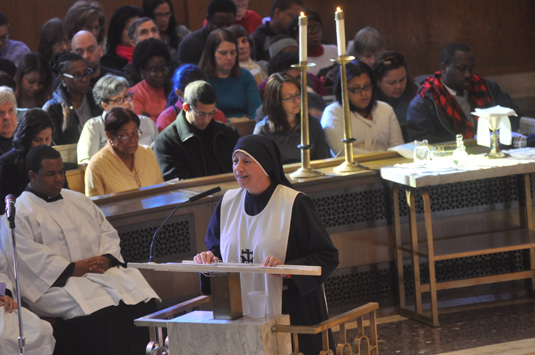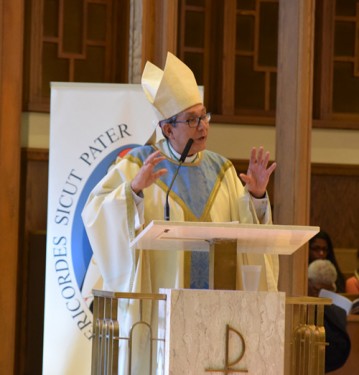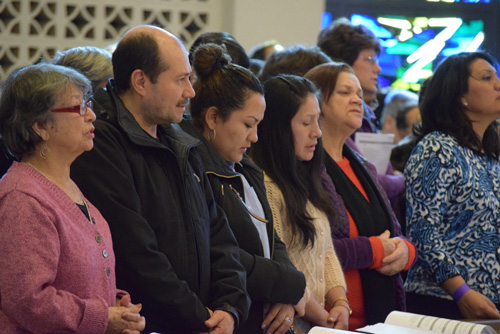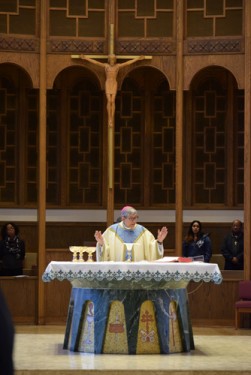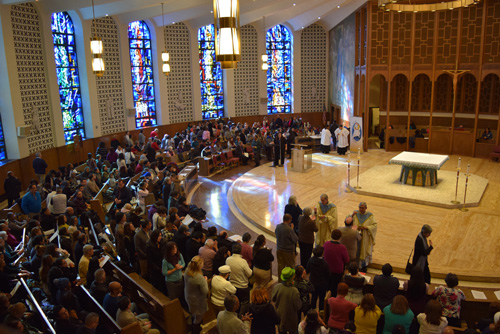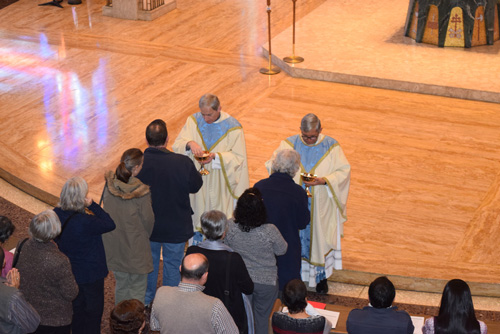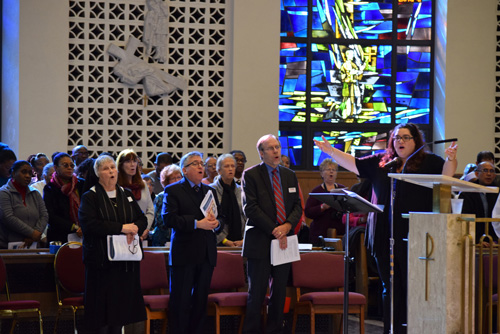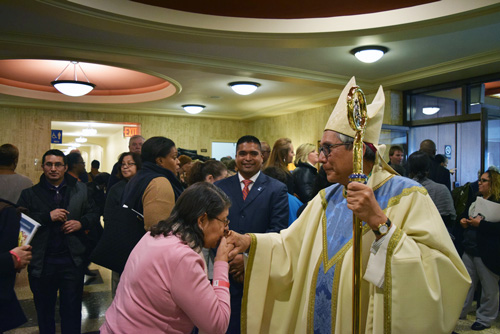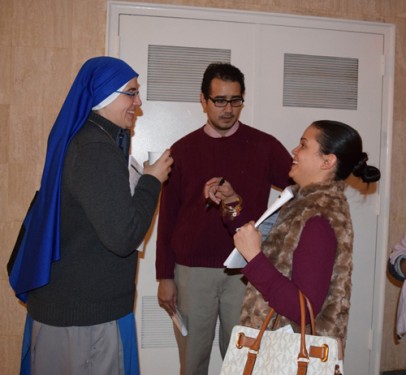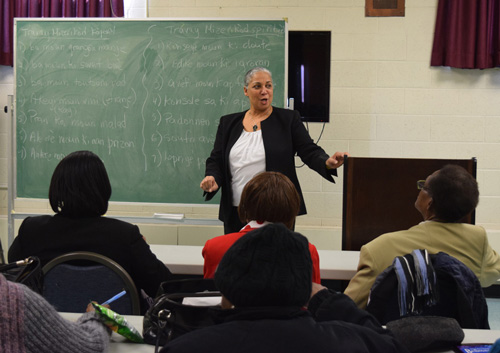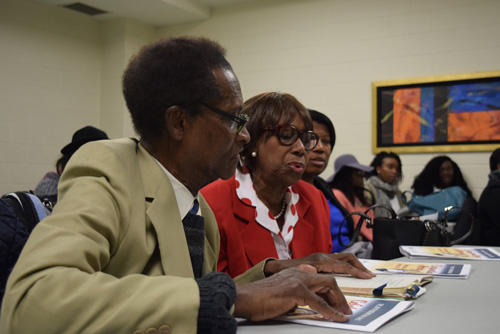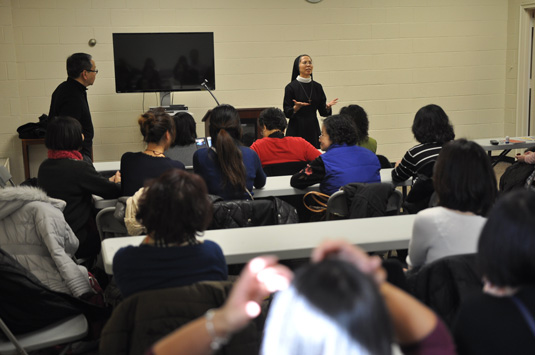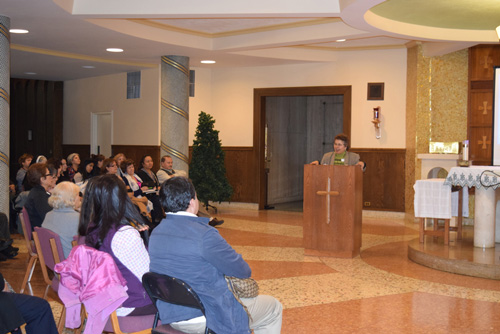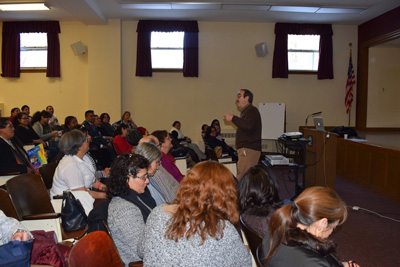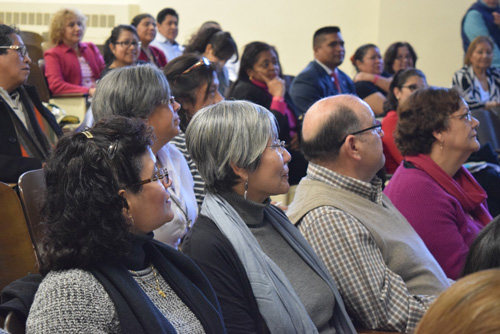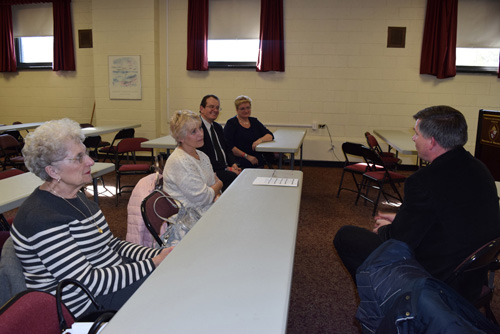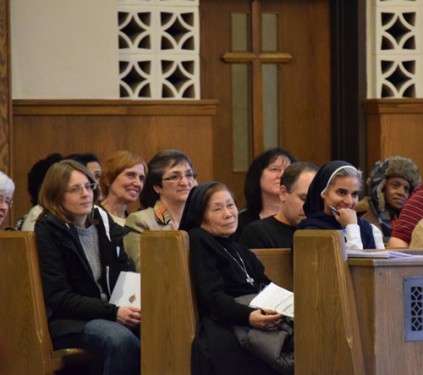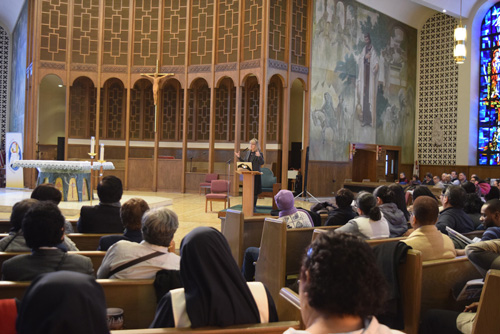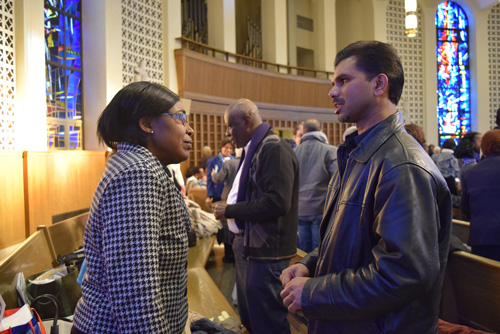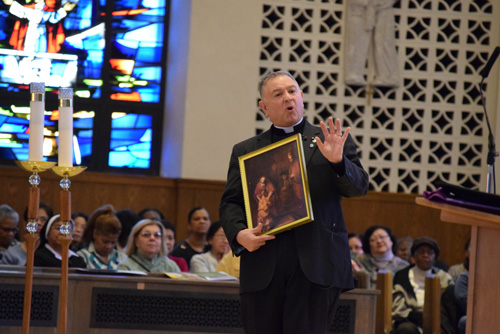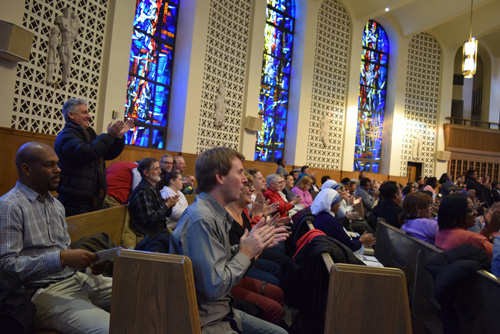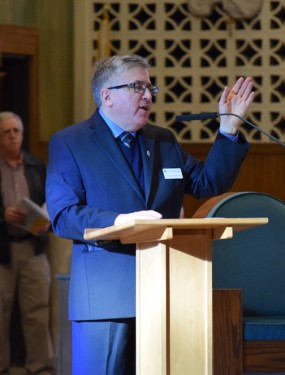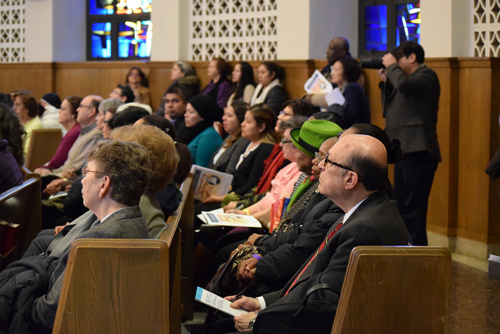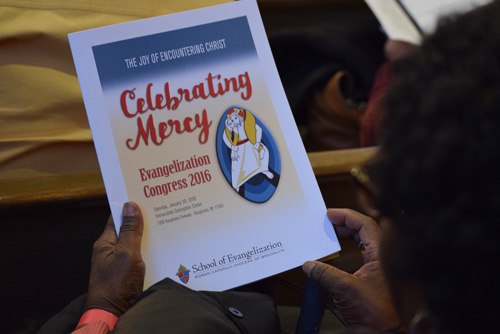By Ed Wilkinson and Maria-Pia Negro Chin
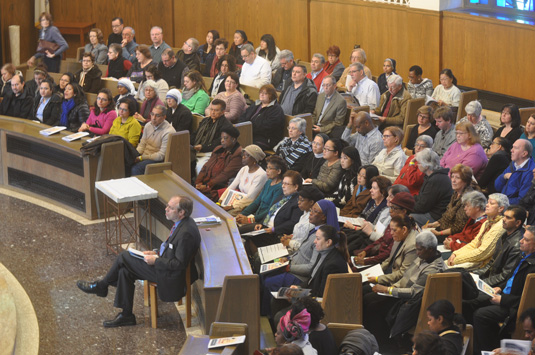
During this Year of Mercy, Catholics have the opportunity to better understand the concept of mercy and to meet Jesus by performing the corporal and spiritual works of mercy.
That was the message of the Diocesan Evangelization Congress held Saturday, Jan. 30, at the Immaculate Conception Pastoral Center, Douglaston.
Sponsored by the diocesan Office of Faith Formation with the theme of “The Joy of Encountering Christ: Celebrating Mercy,” it featured Greg Erlandson, publisher of Our Sunday Visitor, as the keynote speaker.
He used the parable of the Prodigal Son to highlight the concept of mercy and contrasted it with the idea of justice that many people feel is absent from the story.
“I think we are all tempted to sympathize with the older brother,” said Erlandson. “This seems so unjust. Where’s the third degree? The lecture? The consequences?
“What the parable wants us to focus on is the extreme love of the father, who not only goes out to his younger son with compassion, but also goes out to the older son as well.
“When we hear Pope Francis talk about a Church that goes out to the periphery, here is a model: a father with such excessive compassion for his sons that he runs out to meet them and floods them both with his mercy.”
Several times, Erlandson repeated, “God’s ways are not our ways,” adding that there are other paradoxes in the Gospel to the concept of divine mercy.
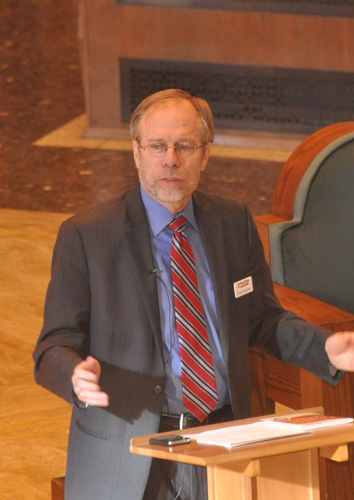
The speaker explained that “the loving kindness of the Lord can ask of us our very life. The loving kindness of the Lord led to the sacrifice of His Son on the Cross. This is God’s mercy, and it is beautiful and terrifying, demanding and yet generous beyond value or expectation.
“This is quite different from how the world sees mercy. Perhaps most common is the assumption on the part of many modern men and women that mercy means tolerance. Mercy is the opposite of judgment, and to be merciful, one is tolerant. But Francis makes clear that ‘we can and must judge situations of sin’ without judging the sinner.”
He said that mercy is more than simply being nice or taking pity on those in need.
“Nothing better captures the paradox of secular society’s understanding of mercy than that perversion of mercy known as ‘mercy killing,’” he said. “The selling of euthanasia or physician-assisted suicide is constantly cloaked in the language of pity.”
To better explain God’s idea of mercy, he quoted the theologian Romano Guardini who wrote:
“Justice is good. It is the foundation of existence. But there is something higher than justice, the bountiful widening of the heart to mercy. Justice is clear, but one step further and it becomes cold. Mercy is genuine, heartfelt; when backed by character, it warms and redeems. Justice regulates, orders existence; mercy creates. Justice satisfies the mind that all is as it should be, but from mercy leaps the joy of creative life.”
The speaker concluded: “I think it is providential that at this time in our history, at this time when fear and anger, when class envy and ethnic hostility are so high, when distrust is rampant, that at this time Pope Francis has called on us to reflect on mercy.”
Erlandson offered several concrete ways to observe the Year of Mercy:
– Rediscover the Sacrament of Reconciliation
– Participate in the “24 Hours for the Lord,” on March 4 and 5
– Recover the Corporal and Spiritual Works of Mercy and reintegrate them into our lives,
– Read the Gospel of Luke, which has been called the Gospel of Mercy, as well as other books on mercy,
– Make a pilgrimage, especially to the sites of the six Holy Doors in Brooklyn and Queens,
“Pope Francis has other ideas about how the Church can model mercy. Once a month on Friday throughout the Holy Year, he plans one event that will serve as an example of mercy lived out in action,” pointed out Erlandson.
“For example, this month he visited a nursing home on the outskirts of Rome, where he chatted with residents, and then went to a facility that provides care for those in a persistent vegetative state as well as for their families.”
Most of all, Erlandson said the Holy Year is simply a chance to pay attention to and reflect on the word “mercy,” in Scripture and how it is used in the Mass.
“We may not be able to go to a prison to help the prisoner. Perhaps we can help a person closer to us imprisoned by depression or anger or envy,” he suggested.
“Look at all the works of mercy we do without reflection in our daily lives, and then do them intentionally, in conscious imitation of the Lord.
“Remember too that mercy is sometimes most difficult to show – and most needed – in our own families.”
(Story continues below)
Theodore Musco, director of the Office of Faith Formation, explained that the diocese’s observance of the “24 Hours for the Lord” will be held at St. James Cathedral-Basilica in Downtown Brooklyn.
When most people in the audience said they had never heard about the event, Musco said that the question that kept repeating itself throughout the day was, “How can we better communicate to the people in the pews and those who do not attend Mass all of the events and opportunities that are offered by the Diocese and the School of Evangelization.”
He asked people to log onto the website meetmein.church, built for the Faith Formation Office by the DeSales Media Group to disseminate all diocesan events.
Musco also said that the Congress could not accommodate all those who wanted to register and that his office would consider holding the congress planned for the fall at St. John’s University where more people could attend.
Wendy Rutherford Cuffie and her husband, from Holy Cross parish, Flatbush, were eager to reflect on the Year of Mercy and the evangelizing mission of the Church in Brooklyn and Queens.
She thought the Congress was wonderful because one needs to “take time to celebrate the mercy of God to be able to celebrate mercy” with each other.
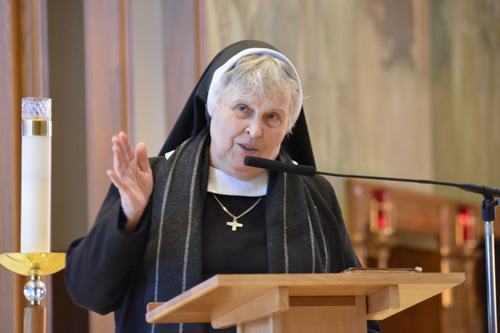
Maria Eugenia Buitrago, parishioner from Blessed Sacrament, Jackson Heights, came with 50 catechists and ministers. With this being her third time at the diocesan congress, she said that the day was like the fuel needed to continue their ministries.
“With each diocesan encounter, we grow in faith, we grow as a church, and we get to know each other and encourage others in this mission,” said Sister Maria Amador, P.C.M. “To meet others who are doing the same, rekindles our faith.”
She added this Congress was filling ministers with the desire to be “living stones of the Church.”
“People echoed the message of mercy,” she said of the reflection session in Spanish following the keynote speech. “And that mercy is here. Not only in going to the prisons but going to those who are in the prisons of loneliness, of incomprehension, of drugs.”
Rachid Murad, a parishioner of Incarnation parish, Queens Village who is preparing to become a deacon, was also reflecting on the keynote speech.
“What really stood out is that every Friday we can have some sort of mercy implemented in our daily lives (as Pope Francis is doing once a month),” he said.
Combining mercy with evangelization was at the heart of the Congress. Musco said that one of the goals of evangelizing in the Diocese of Brooklyn is to reach out to the 80,000 young people who were baptized Catholic but have not gone through religious education.
“Evangelization is not something that can be someone else’s business. We have to do it ourselves,” he said during the period of reflection in English. “I’m so glad to see so many different people from so many different parishes here.”
A way the diocese is embracing evangelization is to be involved in “ARISE together with Christ,” a process of spiritual renewal that seeks to transform people through small-group faith sharing, materials for families with children, parish resources and Christian social action.
At Mass, Auxiliary Bishop Octavio Cisneros said it was time for a renewed effort to bring Christ to others through service and mercy and by being “missionary disciples.” He also encouraged people to continue “encountering Christ and celebrating mercy.”
Vicky Malik, a catechist for 10 years at St. Bartholomew Church, Elmhurst, said it was wonderful to be learning about mercy while so many people were learning about the Eucharist and mercy at the International Eucharistic Congress in the Philippines, her native country.
“I want to learn more,” she said. “I’m preparing children for their Holy Communion and before that is the sacrament of penance,” which is one of the pillars of the Year of Mercy.
After lunch, participants went to breakout sessions in Creole, English, Mandarin, Spanish and Polish.
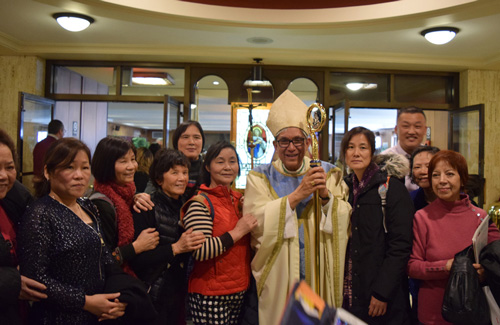
In her session, Sister Monica Gan talked about how mercy gives life and vitality to evangelization, making it fruitful. “We reflected on the things the Pope wants us to do in the Year of Mercy: pilgrimages, reconciliation and going back to the Bible,” she said.
In one session, Father Joseph Gibino, pastor of Holy Trinity, Whitestone, talked about the importance of focusing on the Spiritual Works of Mercy. This struck a cord with Dharnelle Noel, a young adult from Holy Innocents Church, Flatbush. She said this workshop made her recall her Catholic education.
“Now that I’m older I understand that … corporal works of mercy are easy to do, you can feed the hungry, you can do all of these things; but to forgive when somebody isn’t asking for forgiveness or when somebody hurts you – whether it is deliberate or not – is very hard.”
Jefferson Pazmino, of SS. Joachim and Anne Church, Queens Village, liked the Spanish workshops – given by Deacon Asterio Velasco and Aida Hidalgo – because they focused on how everyone is called to be merciful like the father in the Prodigal Son parable and how to transmit that mercy, healing and forgiveness to others.
During a Creole workshop, Soeurette Fougere spoke about how an act of mercy can bring joy and transform lives. The Polish sessions – conducted by Father Andrzej Klocek and Krzysztof Gospodarzec – touched upon the sacrament of confession and Jesus and Mary as teachers of mercy.
Leisa Anslinger, one of the speakers, reflected on how to share mercy daily to build relationships.
“Every Sunday is an invitation to experience God’s mercy,” she said. “What inspires us to share our faith with one another is this embracing of mercy.”
Ruth B. Watt, from St. Clement Pope, Jamaica, said experiencing the Congress with parish friends was enlightening. “There was an awakening taking place,” she said. “I’ve met three popes (in my lifetime) and this (experience at the Congress) was up there with that.”

